Can this be argenteus?
Lou has suggested that I post a picture of this bird here. It is a herring gull photographed in East Lothian, SE Scotland, this month. The question is, can this be a local argenteus or does this primary pattern indicate it is an argentatus or intergrade from further afield?
Thanks
Geoff
Thanks
Geoff
- Attachments
-
- IMG_4783.JPG (156.21KiB)Viewed 12847 times
-
- IMG_4782.JPG (161.73KiB)Viewed 12847 times
Re: Can this be argenteus?
Such a long, pale tongue on the underside of P10 is highly unusual in pure argenteus. However, it is slightly more regular in Dutch birds (many of which are probably intergrades argenteus x argentatus).
Here is a bit of a similar adult; it was defending a territory in a Belgian argenteus colony last spring: A bird like this could be a very old argenteus, or an intergrade argenteus x argentatus.
Also, have a look at the PowerPoint on http://www.gull-research.org/miscellane ... neous.html.
Here is a bit of a similar adult; it was defending a territory in a Belgian argenteus colony last spring: A bird like this could be a very old argenteus, or an intergrade argenteus x argentatus.
Also, have a look at the PowerPoint on http://www.gull-research.org/miscellane ... neous.html.
Re: Can this be argenteus?
Thanks for the link to the powerpoint - it gives a really good idea of the variation within (I assume) a single colony.
Could be that we have a little of that variation in SE Scotland as well.
Geoff
Could be that we have a little of that variation in SE Scotland as well.
Geoff
-
Kent Olsen
- Posts:46
- Joined:Wed Dec 02, 2009 11:07 pm
Re: Can this be argenteus?
Here is another Herring Gull with long, pale tongue on the underside of P10. Please note the yellowish leg colour indicating an eastern or north-eastern origin.
http://3.bp.blogspot.com/_wpfoS655UiU/R ... 1.2007.JPG
and
http://1.bp.blogspot.com/_wpfoS655UiU/R ... 1.2007.JPG
http://3.bp.blogspot.com/_wpfoS655UiU/R ... 1.2007.JPG
and
http://1.bp.blogspot.com/_wpfoS655UiU/R ... 1.2007.JPG
Re: Can this be argenteus?
Sure! But this topic is about the subspecies argenteus...
A long tongue on P10 is quite normal in the subspecies argentatus, of course.
A long tongue on P10 is quite normal in the subspecies argentatus, of course.
Re: Can this be argenteus?
Have started looking for thayeri type birds in Edinburgh again now that most of the wintering argentatus should be away. Obviously I'd have to find some breeders with this pattern to know whether these intergrades are part of the local population in South East Scotland. Nevertheless, here are a couple of birds with thayeri P9 and one of them also has the same on P7 (probably of one wing only). The latter was an injured bird with one leg and I wondered whether its unusual plumage could be in some way related...
Sorry for the poor pics - I'll have to get a better lens one day... If interested, there are more pics of the birds at
http://morgithology.blogspot.com/2011/0 ... ttern.html
and
http://morgithology.blogspot.com/2011/0 ... ri-on.html
Sorry for the poor pics - I'll have to get a better lens one day... If interested, there are more pics of the birds at
http://morgithology.blogspot.com/2011/0 ... ttern.html
and
http://morgithology.blogspot.com/2011/0 ... ri-on.html
Re: Can this be argenteus?
Bird 1 quite baffles me because the white mirror of P9 is limited to the inner web; the outer web is black - a true thayeri pattern indeed.
This is very unusual for European Herring Gull. In birds with large white mirrors and long tongues, the white mirror of P9 normally covers the outer web too.
In Scotland, perhaps one other possibility should be considered: hybrids Glaucous x Herring Gull - though one would not expect these to be still present in late spring, I guess ?
This is very unusual for European Herring Gull. In birds with large white mirrors and long tongues, the white mirror of P9 normally covers the outer web too.
In Scotland, perhaps one other possibility should be considered: hybrids Glaucous x Herring Gull - though one would not expect these to be still present in late spring, I guess ?
- marsmuusse
- Posts:666
- Joined:Sun Sep 27, 2009 12:43 pm
Re: Can this be argenteus?
The powerpoint that was refered to earlier, does not include all the birds. I'll drop some images here:
(1) Larus argentatus argenteus female orange tibia ring HP, 05 May 2006, Moerdijk, the Netherlands. Bird with an (almost) thayeri, but subterminal band on P10 and hardly a mirror on P9.
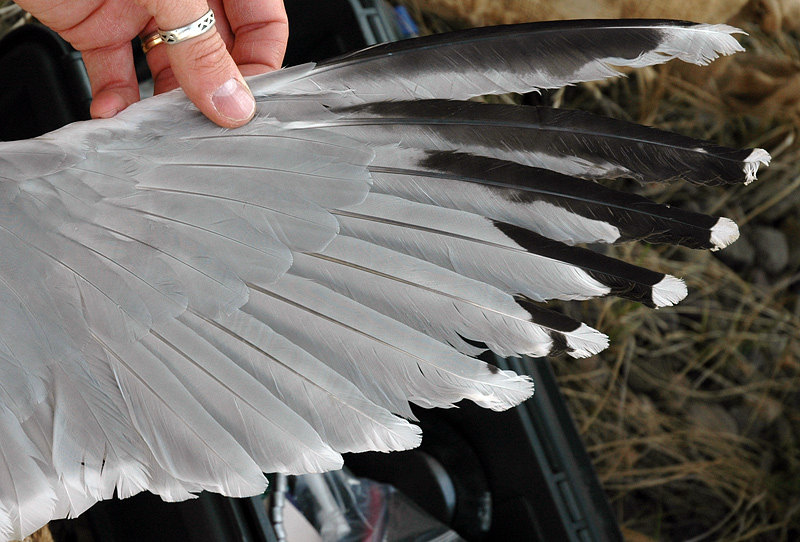
and
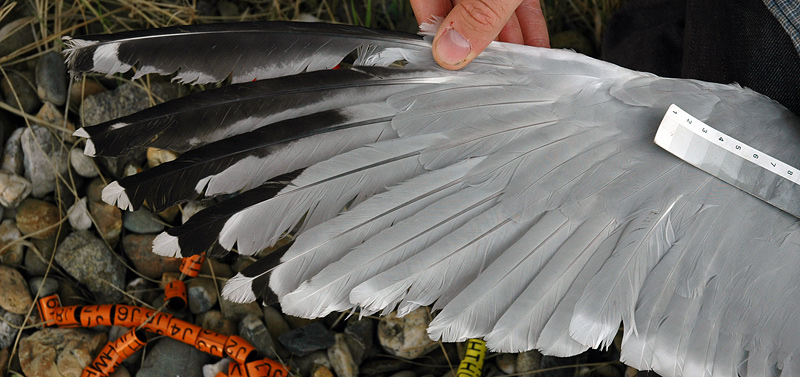
(2) Larus argentatus argenteus female mintgreen tibia ring NH, 16 May 2006, Moerdijk, the Netherlands.
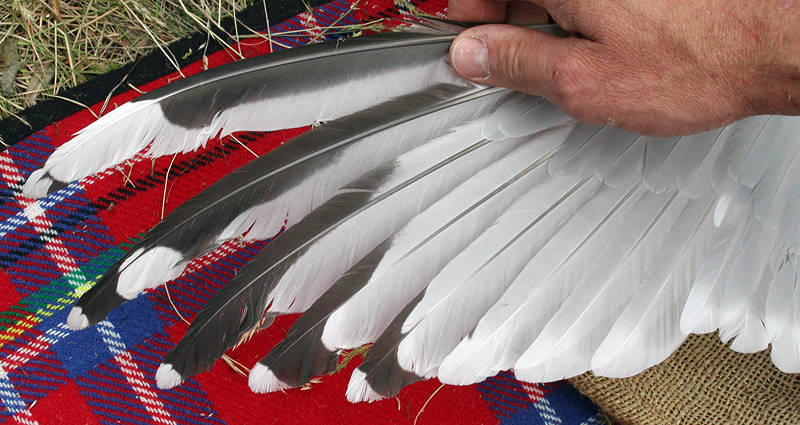
and
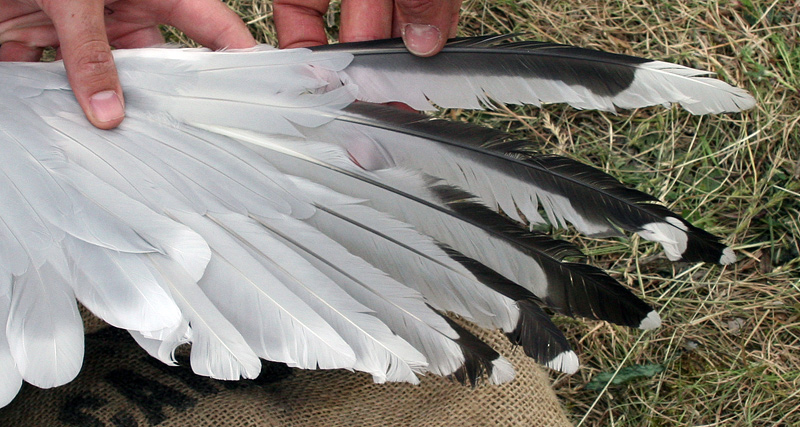
(3) Larus argentatus argenteus metal tarsus NLA 5.363.004 12 July 2005, Moerdijk, the Netherlands. The single bird in the sample showing an 'orange' orbital ring. All other birds showing yellow orbital rings.
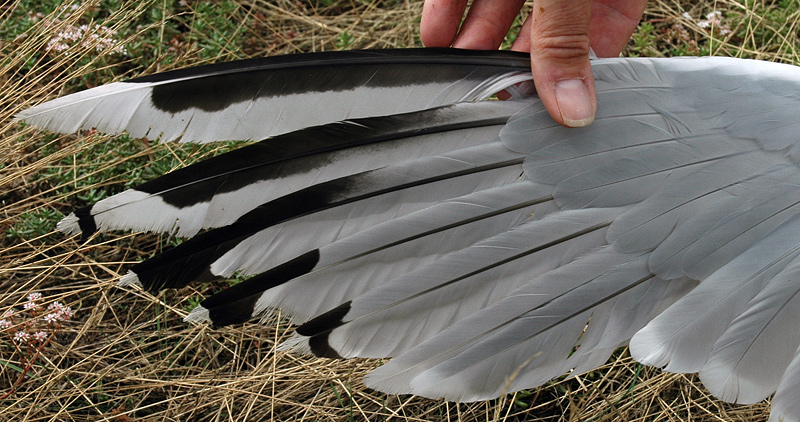
and

(4) Larus argentatus argenteus female mintgreen tibia ring 1V, 05 May 2005, Moerdijk, the Netherlands.
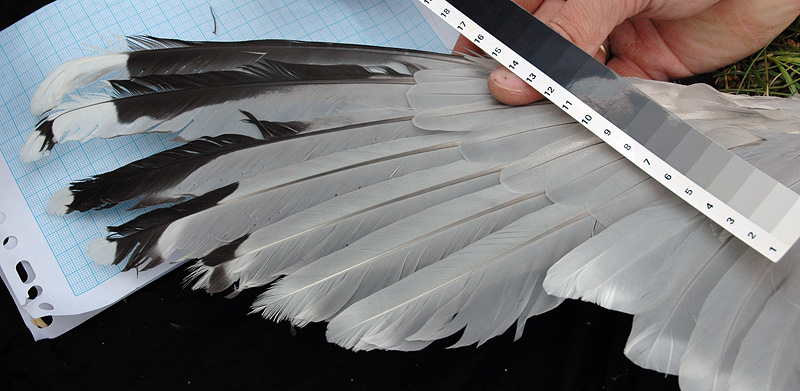
and
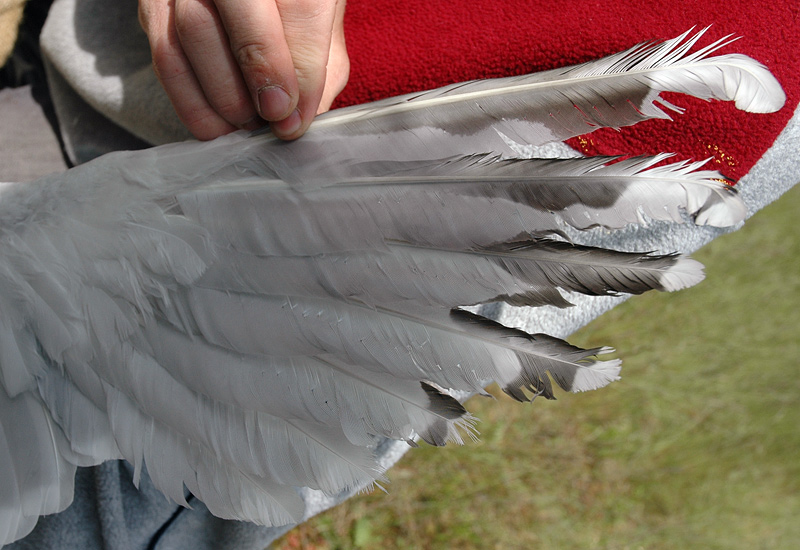
(5) Larus argentatus argenteus female mintgreen tibia ring 68, 21 May 2005, Moerdijk, the Netherlands.
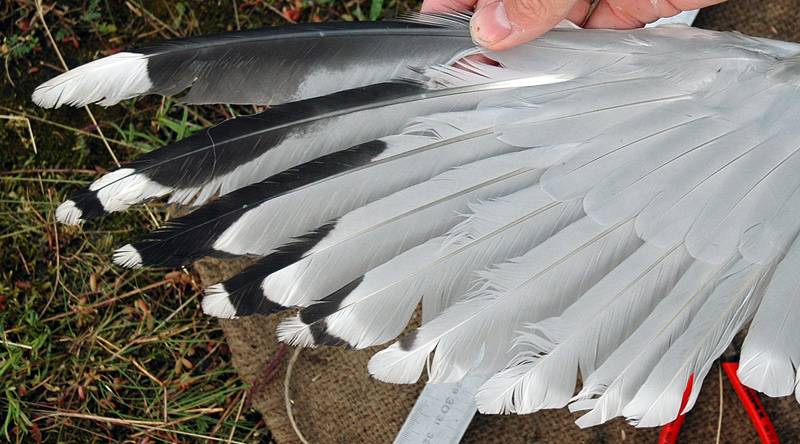
These are all birds trapped on the nest, using walk-in cages. All ringed after 1cy, none of them was ringed as pullus, hence no provenance of origin, but we may say they are now part of the "Dutch population" at the Moerdijk colony.
(1) Larus argentatus argenteus female orange tibia ring HP, 05 May 2006, Moerdijk, the Netherlands. Bird with an (almost) thayeri, but subterminal band on P10 and hardly a mirror on P9.

and

(2) Larus argentatus argenteus female mintgreen tibia ring NH, 16 May 2006, Moerdijk, the Netherlands.

and

(3) Larus argentatus argenteus metal tarsus NLA 5.363.004 12 July 2005, Moerdijk, the Netherlands. The single bird in the sample showing an 'orange' orbital ring. All other birds showing yellow orbital rings.

and

(4) Larus argentatus argenteus female mintgreen tibia ring 1V, 05 May 2005, Moerdijk, the Netherlands.

and

(5) Larus argentatus argenteus female mintgreen tibia ring 68, 21 May 2005, Moerdijk, the Netherlands.

These are all birds trapped on the nest, using walk-in cages. All ringed after 1cy, none of them was ringed as pullus, hence no provenance of origin, but we may say they are now part of the "Dutch population" at the Moerdijk colony.
Re: Can this be argenteus?
Thanks for the info and pics. The thayeri-type bird looks very similar to the mintgreen NH picture. I had another close look at my original shots and the mirror on P9 does extend across to the outer web, though there is a complete black border on the right and incomplete border on the left wing. Certainly seems reasonable that there would be similar birds here and in Dutch colonies... So, presumably an intergrade?
.....
Just to add to the 'can this be argenteus?' theme - below is another bird that I saw at the same site this evening. It has yellow(ish) legs so caught my eye as its the first I have seen at the site. I was hoping for a Finnmark yellow legged argentatus but the wingtip pattern is maybe not right for one of those birds? What does look unusual to me is the 'sawn-off' black outer webs to P6-8. The herring gulls I see tend to have more pointed black markings on this web. Any thoughts?
.....
Just to add to the 'can this be argenteus?' theme - below is another bird that I saw at the same site this evening. It has yellow(ish) legs so caught my eye as its the first I have seen at the site. I was hoping for a Finnmark yellow legged argentatus but the wingtip pattern is maybe not right for one of those birds? What does look unusual to me is the 'sawn-off' black outer webs to P6-8. The herring gulls I see tend to have more pointed black markings on this web. Any thoughts?
Re: Can this be argenteus?
As a coincidence, I saw this bird at Oostende, Belgium, today:
I think the pattern on the outer primaries is so extreme that this has to be a hybrid Glaucous x Herring Gull.
The bird had pale grey upperparts like argenteus.
It certainly fits many adult birds from Iceland!
I think the pattern on the outer primaries is so extreme that this has to be a hybrid Glaucous x Herring Gull.
The bird had pale grey upperparts like argenteus.
It certainly fits many adult birds from Iceland!